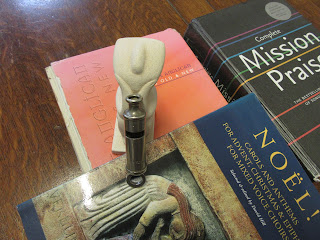Ash Wednesday
Today is Ash
Wednesday. In a normal year, I would
probably be at church to mark the start of Lent. In February 2021, we are nowhere near back to
normality yet.
Since the first lockdown began last March, I have been to few church events. One was a drive-in Harvest Festival in a field behind the church, a combined event between the local Anglican and Methodist churches, with a tractor collecting donations for food banks. As we were socially distanced by sitting in cars, we were allowed to sing, including a version of Estelle White’s ‘AutumnDays’ rewritten for 2020 (so that instead of referring to aeroplanes being refuelled, it rejoiced that ‘September’s here – no-one’s being home-schooled!’ and gave thanks for ‘floral face-masks’ and ‘the village Facebook page’).
I also attended
a socially distanced carol concert just before Christmas, with all of us standing around in
the churchyard singing to each other, to passers-by in the lane, and to a
couple of horses in a field.
My Beloved Partner, PDB11, has been to
church rather more frequently this year, but only to play the organ at funerals
and, once, at the wedding of an elderly couple who had decided that, in view of
their age and the pandemic, they had better seize the opportunity to get
married while they could.
As music is an
important part of worship for both of us, it hasn’t really seemed worth going
to services with no singing and no Holy Communion. We decided that, with limited spaces in
church pews because of social distancing, single people probably needed the
social contact more than we did.
On the other
hand, we have been praying together at home more often than we used to (usually
three or four times a week). Sometimes
we finish by singing a few hymns. At
other times, I borrow one of PDB11’s many books of hymns or Christmas carols so
that I can practise playing them on my recorder. I play alone, partly so that it won’t
distract my highly musical partner when I play a wrong note.
More
importantly, though, I don’t want to upset him when I become over-emotional. I cry easily, and he knows that sometimes
this is because I have taken a line in a song the wrong way and am worried by
what I take it to mean.
However, I also
cry with happiness, or because an idea is beautiful, or because I have just
realised something that I should have known all along, and either hadn’t
noticed or hadn’t believed, or had forgotten.
Sometimes hymns inspired by Bible passages point out things to me that I
had overlooked when actually reading the Bible.
As it isn’t easy for an observer to tell what sort of crying I’m doing
and how to respond, it’s simpler if I cry in private until I’ve decided how I
feel.
For example,
since the Ash Wednesday service is centred on the theme of repentance, many of
the hymns recommended for this day are based on Psalm 51. This is a poem whose meaning I frequently
distort, simply because it contains the lines: ‘The sacrifice acceptable to God
is a broken spirit; a broken and contrite heart, O God, you will not despise.’
To me ‘a broken
heart’ implies dying of grief and despair, as happens to
so many characters in Shakespeare: John of Gaunt, Romeo’s mother, Enobarbus,
little Prince Mamilius in A Winter’s Tale,
King Lear, and (one of the deaths that haunts me the most in literature)
Falstaff in Henry V after Hal refuses
to have any further contact with him. So
I worry that God is a sadist who is pleased only when all joy and hope is
crushed out of us and we no longer want to live.
But, of course,
the psalmist isn’t talking about despair.
The speaker in Psalm 51 is guilty of adultery, murder, and probably rape, and he knows
that he cannot bribe God to let him off by offering material sacrifices. To be reconciled with God, he needs to be
genuinely sorry for his crimes. He prays
for forgiveness precisely because he knows that God loves him and will forgive
him – the opposite of Falstaff having to accept that Hal is never going to be
friends with Falstaff again, and had probably never truly loved him in the
first place.
The idea that
God loves us makes all the difference.
Where Charles Wesley’s ‘O For A Heart To Praise My God’ prays for ‘a heart resigned, submissive,
meek,’ the word ‘resigned’ to me would usually imply ‘fatalistically accepting
that there is no hope’. But there is
nothing despairing in Wesley’s prayer to be ‘resigned’ to learning to be as
generously loving as God is.
A stronger
reason to criticise Psalm 51 might be the line ‘Against you, you only, have I
sinned and done what is evil in your sight; so you are right in your verdict
and justified when you judge.’ What
about the people the speaker has hurt?
Doesn’t sinning against them matter?
I don’t think
the poet means to imply that God is only interested in His own glory. It is rather that, as God loves everyone He
has created, then hurting people is a sin against God. And, logically, this must include hurting
ourselves, as well as hurting others.
Many prayers of
repentance paint sin simply as being selfishly hedonistic and ignoring
God. But if we take ‘sin’ to mean
everything that separates us from God, then most of my sins have stemmed from
being obsessed with God while having a distorted idea of what God is like. This is not something I can resolve by
saying, ‘I’m sorry – please forgive me.’
But it is something that I can help myself overcome by praying, and
singing or playing hymns about God’s love, until the message starts to sink in.




Comments
Post a Comment